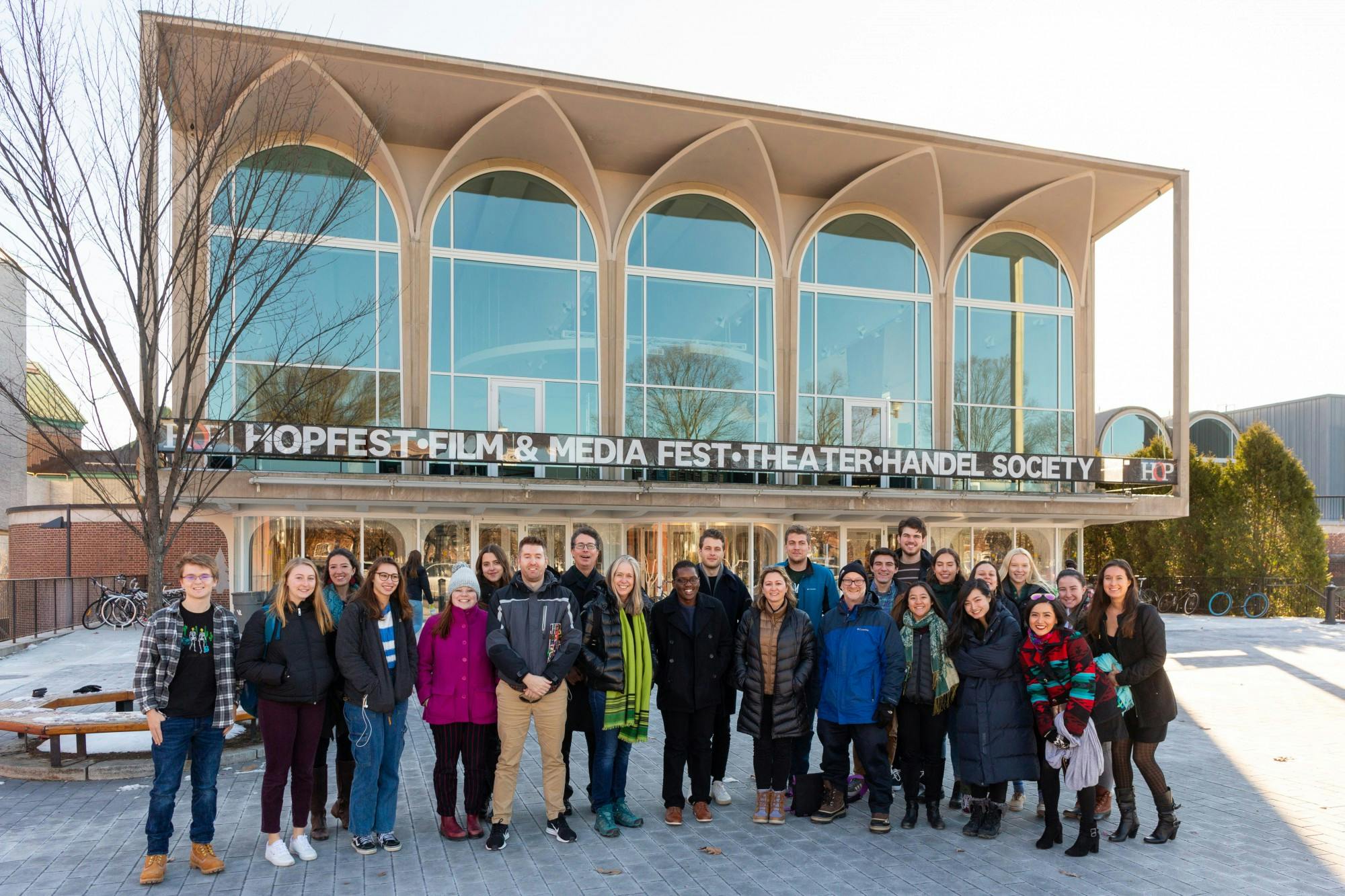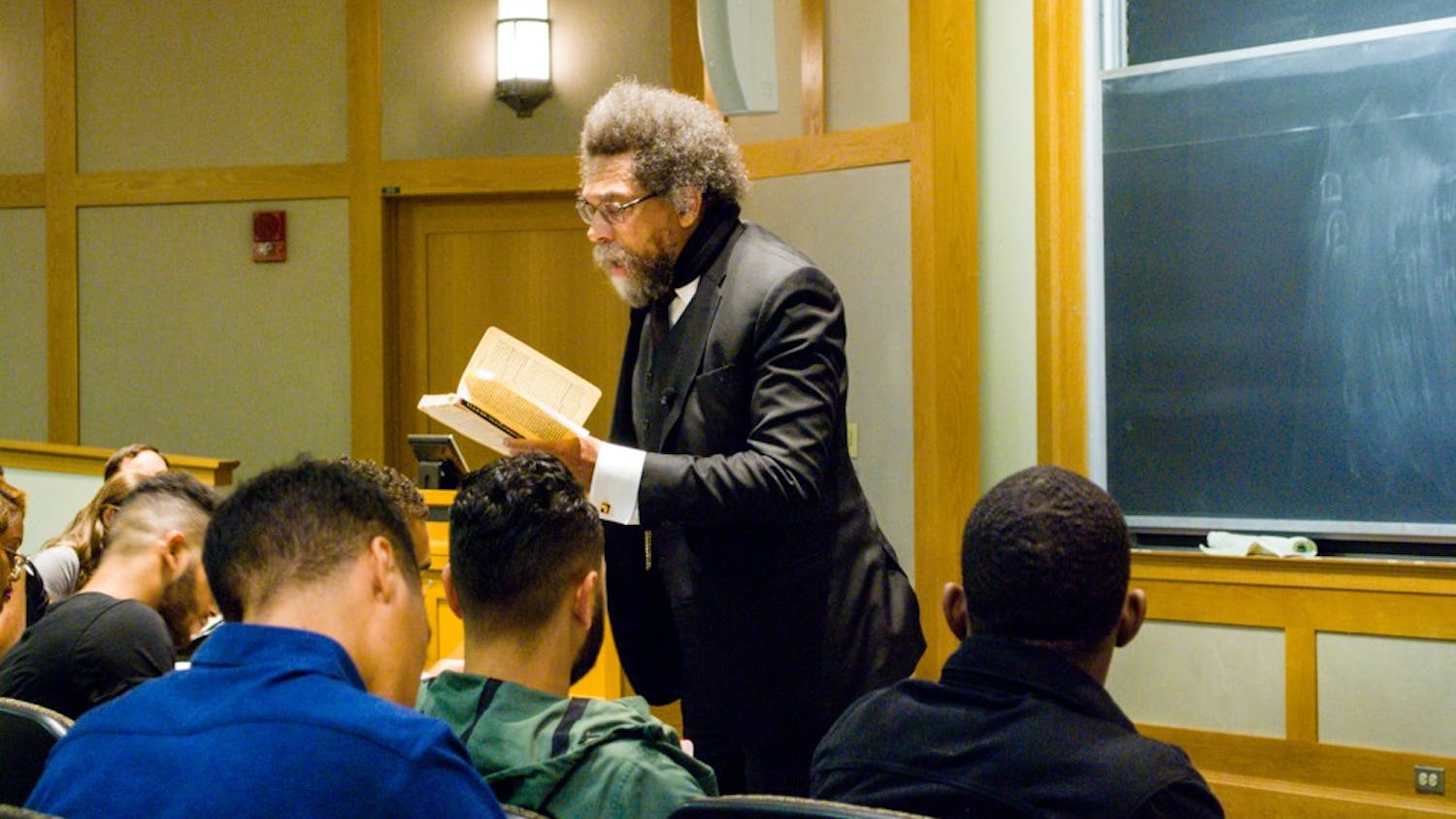This past weekend, the Hopkins Center hosted a number of events for students, alumni and community members to come together and explore the fields of film and media through a variety of lenses. The inaugural Film and Media Alumni Fest brought eight alumni from across the industry to discussions and panels. The conference also incorporated a number of the alums’ recent works in film and media and a series of networking events for students to meet alumni and learn about their respective fields.
In putting together the event, organizers Johanna Evans ’10, the Hop’s film programming and operations manager, and Sydney Stowe, director of Hopkins Center Film, operated under the goal of creating a forum for student experiential learning about the film and media industry.
“It’s always great when we have an opportunity for us to reestablish and strengthen our connection to alums who really enjoyed their time here and really feel strongly about Dartmouth as a school where you can go to learn about the arts and to pursue an arts career,” Evans said. “We want to strengthen this relationship so maybe these alums will come back and share more with future students.”
The series of events opened with a student documentary showcase. The four student-made short films, created as final assignments for FILM 30, “Documentary Videomaking,” shed light on a wide range of topics relevant to the local community, including homelessness, car-racing and hookup culture.
The following night presented another film: Trey Edward Shults’ “Waves” presented audiences with the shattering of a suburban African American family and their ensuing efforts to pick up the pieces. A heart-rending story built on beautiful cinematography and a distinctive pop soundtrack, “Waves” tells two tales in one, commencing with a dramatic, fast-paced spiral and following with the calmer, quieter reconciliation.
After the screening, Mac Simonson ’16 of A24 Films joined Dartmouth’s visiting history professor Derrick White and Devin Powell ’22 to discuss the personal basis of the movie.
“From a production standpoint, this seemed like [Shults’] most ambitious project,” Simonson said at the post-film discussion. “He worked with the lead actor here ... It’s based loosely on both of their lives; the father character is a combination of both of their fathers, and the central relationships in each half are based on things in their lives.”
As the first event open to the community, “Waves” served as an additional kick-off to the cinematic theme of the event. Following the showing and discussion, students had the opportunity to attend an after party where they could speak with Simonson directly as well as with peers interested in film and media about their thoughts on the film.
The final day of the event hosted another two movies beginning with Oualid Mouaness’ “1982,” a retelling of the 1982 invasion of Lebanon through the eyes of students and teachers in a school on the edge of Beirut. As the conflict escalates, 11-year-old Wissam works up the courage to speak to his crush, and his teachers espouse different political ideologies while attempting to shield the children from the collapse of the world outside.
Producer Alix Madigan ’84 explained to Stowe the deep truths of this story, drawn directly from Mouaness’ own experience as a 10-year-old during the initial bombing of Beirut.
“The film is really entirely autobiographical,” Madigan said. “Mouaness went to a school very similar to this one during the 1982 invasion — he witnessed the bombing of Beirut from that perspective. But then there were so many images of children in war zones, and it became a topic that I felt should be explored cinematically.”
As a cinematic finale for the conference, Craig Brewer’s “Dolemite Is My Name” presented the true story of comedian Rudy Ray Moore. Evans explained the organizers’ decision in presenting this particular film as the concluding event.
“We wanted to balance genre of film,” Evans said. “We had two relatively heavy films already with ‘1982’ and ‘Waves,’ so we picked ‘Dolemite’ for that reason.”
“Dolomite Is My Name” perfectly fit that need; the film explores topics of race in media through a hilarious telling of Moore’s story. Acclaimed comic and actor Eddie Murphy embodies the unwavering perseverance, spirit and humor of his character through his rollercoaster of successful and innovative misadventures. In the following discussion with producer Michelle Brattson Majors ’96 of Netflix and music supervisor Barry Cole ’93, Evans spoke to the importance of representation in film.
“One of the things I found interesting about the film is it’s hysterical, and yet, it’s covering a lot of interesting ground in terms of representation in cinema,” Evans said.
While the post-movie discussions highlighted a few of the attending alums who held relevance to the specific films, the aptly named “Alumni Storytelling Roundtables” provided a space for all attending alums to detail their respective journeys, goals and fields of expertise.
The films and roundtables continually linked back to another focus of the event: beyond creating a space for industry education for students, the fest generated discussion surrounding intersectionality in film and media, according to Evans.
“Intersectionality was not an official theme of this weekend’s festival,” Evans said. “But it was unofficially guiding what kind of conversations we wanted to have and what we wanted to talk about.”
Allie Young ’13 of Harness, an organization focused on the intersection of social justice and entertainment, presented her work in fostering native representation, particularly for women, in media.
“When you look at film history, a lot of the content that exists is white savior narratives,” Young said at the first roundtable. “I always say native people in Westerns are merely a prop, and when we do get an opportunity to have the stage, those stories are always centralized on native men. There’s nothing out there that tells the stories of native women, and that needs to change.”
Other speakers like Young came from a wide variety of careers across the film and media industry beyond traditional production work. City University of New York Queens College professor Noah Tsika ’05 studies Nollywood, the Nigerian film industry; Rochester Institute of Technology professor Owen Gottlieb ’95 researches and works in game design; Tara Paniogue ’14 writes about fashion and entertainment for the Los Angeles Times; and music supervisor Barry Cole works on the music side of film, building soundtracks and managing licensing.
Looking forward to the winter term, Evans promised interesting film viewing opportunities and continued chances for students to learn about creative industries and cinema.
“One of the things we hope is that weekends like this help reengage students in cinema culture,” Evans said. “Winter, with Oscars season, is always a great time to have deep conversations about where cinema is going and what kind of movies deserve awards, and we hope students will join us in the winter for tons of great movies as well.”



